Bachelor of Early Childhood Studies: Play Theories and ICT Impact
VerifiedAdded on 2021/04/21
|5
|1122
|48
Essay
AI Summary
This essay delves into the foundational play theories of Jean Piaget, Lev Vygotsky, Sigmund Freud, and Gregory Bateson, examining their perspectives on how children acquire knowledge and develop essential skills through play. Piaget's theory highlights the stages of cognitive development, emphasizing the role of assimilation and accommodation. Vygotsky's theory stresses the importance of social context and learning from others. Freud's theory focuses on how play facilitates self-regulation and the expression of emotions. Bateson's theory explores how children learn communication through play. The essay also considers the impact of Information and Communication Technology (ICT) on these processes, discussing how digital tools and games can enhance learning and development in early childhood education. The essay references relevant research to support the analysis of each theory. It provides a comprehensive overview of the key concepts and their implications for early childhood education practices.
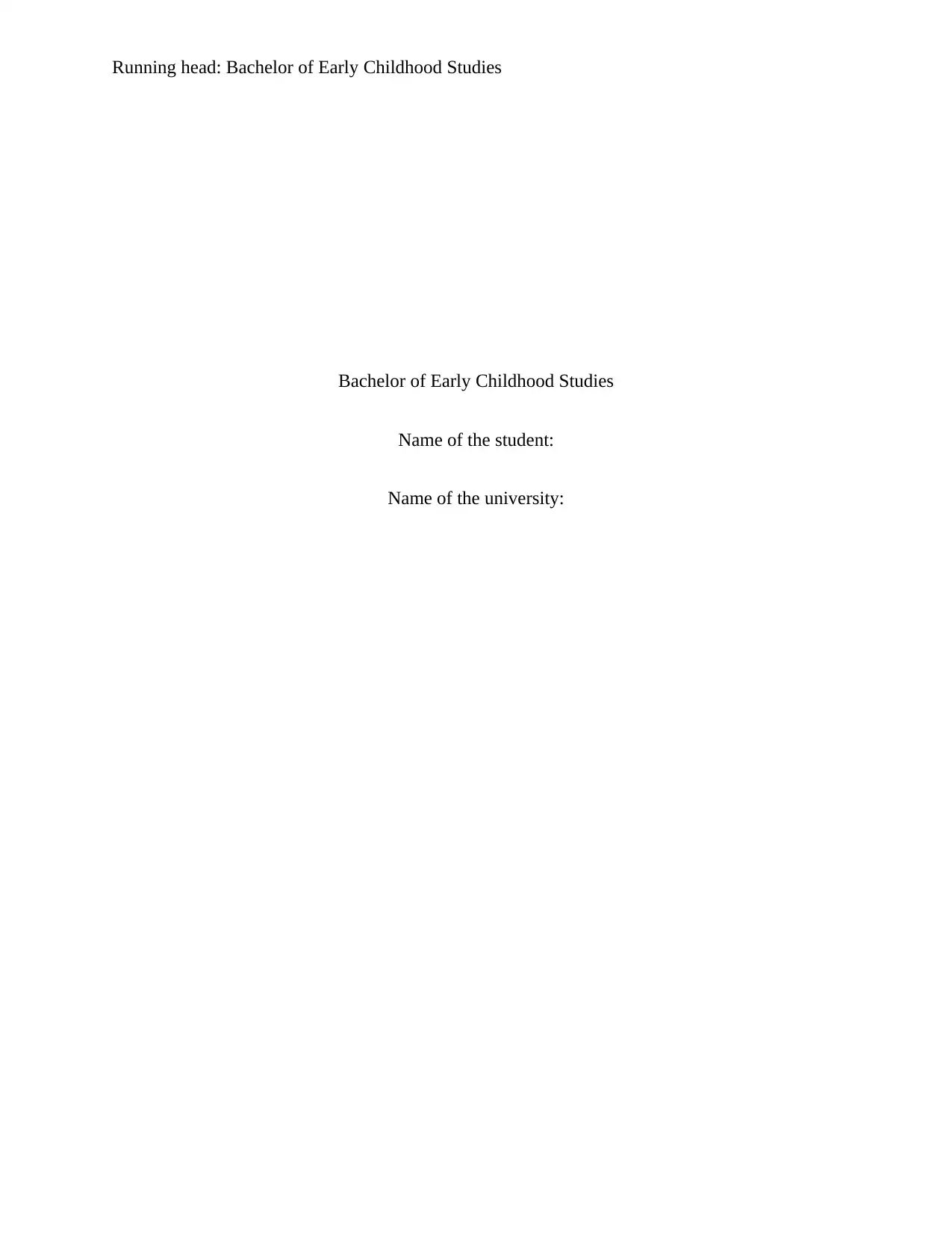
Running head: Bachelor of Early Childhood Studies
Bachelor of Early Childhood Studies
Name of the student:
Name of the university:
Bachelor of Early Childhood Studies
Name of the student:
Name of the university:
Paraphrase This Document
Need a fresh take? Get an instant paraphrase of this document with our AI Paraphraser
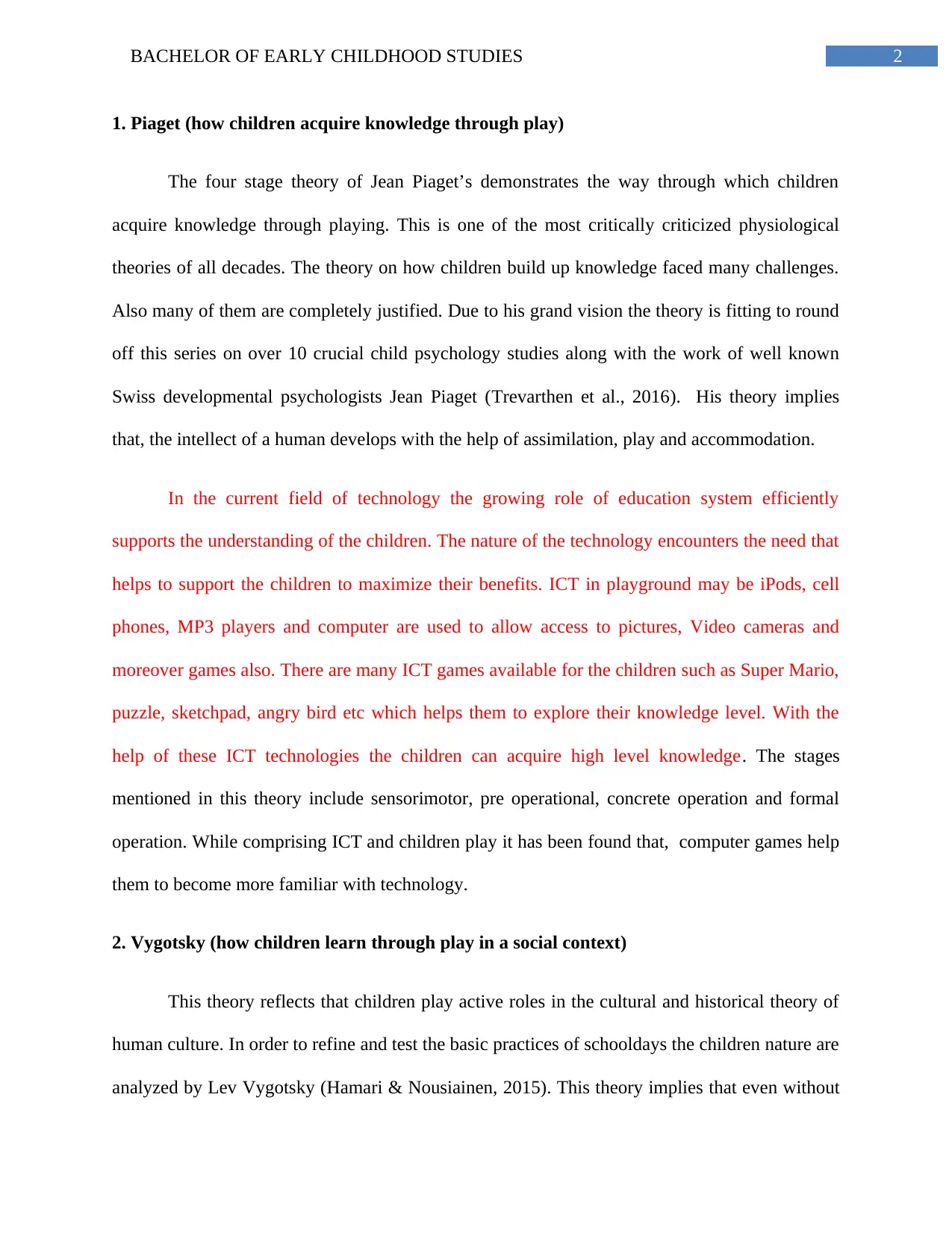
2BACHELOR OF EARLY CHILDHOOD STUDIES
1. Piaget (how children acquire knowledge through play)
The four stage theory of Jean Piaget’s demonstrates the way through which children
acquire knowledge through playing. This is one of the most critically criticized physiological
theories of all decades. The theory on how children build up knowledge faced many challenges.
Also many of them are completely justified. Due to his grand vision the theory is fitting to round
off this series on over 10 crucial child psychology studies along with the work of well known
Swiss developmental psychologists Jean Piaget (Trevarthen et al., 2016). His theory implies
that, the intellect of a human develops with the help of assimilation, play and accommodation.
In the current field of technology the growing role of education system efficiently
supports the understanding of the children. The nature of the technology encounters the need that
helps to support the children to maximize their benefits. ICT in playground may be iPods, cell
phones, MP3 players and computer are used to allow access to pictures, Video cameras and
moreover games also. There are many ICT games available for the children such as Super Mario,
puzzle, sketchpad, angry bird etc which helps them to explore their knowledge level. With the
help of these ICT technologies the children can acquire high level knowledge. The stages
mentioned in this theory include sensorimotor, pre operational, concrete operation and formal
operation. While comprising ICT and children play it has been found that, computer games help
them to become more familiar with technology.
2. Vygotsky (how children learn through play in a social context)
This theory reflects that children play active roles in the cultural and historical theory of
human culture. In order to refine and test the basic practices of schooldays the children nature are
analyzed by Lev Vygotsky (Hamari & Nousiainen, 2015). This theory implies that even without
1. Piaget (how children acquire knowledge through play)
The four stage theory of Jean Piaget’s demonstrates the way through which children
acquire knowledge through playing. This is one of the most critically criticized physiological
theories of all decades. The theory on how children build up knowledge faced many challenges.
Also many of them are completely justified. Due to his grand vision the theory is fitting to round
off this series on over 10 crucial child psychology studies along with the work of well known
Swiss developmental psychologists Jean Piaget (Trevarthen et al., 2016). His theory implies
that, the intellect of a human develops with the help of assimilation, play and accommodation.
In the current field of technology the growing role of education system efficiently
supports the understanding of the children. The nature of the technology encounters the need that
helps to support the children to maximize their benefits. ICT in playground may be iPods, cell
phones, MP3 players and computer are used to allow access to pictures, Video cameras and
moreover games also. There are many ICT games available for the children such as Super Mario,
puzzle, sketchpad, angry bird etc which helps them to explore their knowledge level. With the
help of these ICT technologies the children can acquire high level knowledge. The stages
mentioned in this theory include sensorimotor, pre operational, concrete operation and formal
operation. While comprising ICT and children play it has been found that, computer games help
them to become more familiar with technology.
2. Vygotsky (how children learn through play in a social context)
This theory reflects that children play active roles in the cultural and historical theory of
human culture. In order to refine and test the basic practices of schooldays the children nature are
analyzed by Lev Vygotsky (Hamari & Nousiainen, 2015). This theory implies that even without
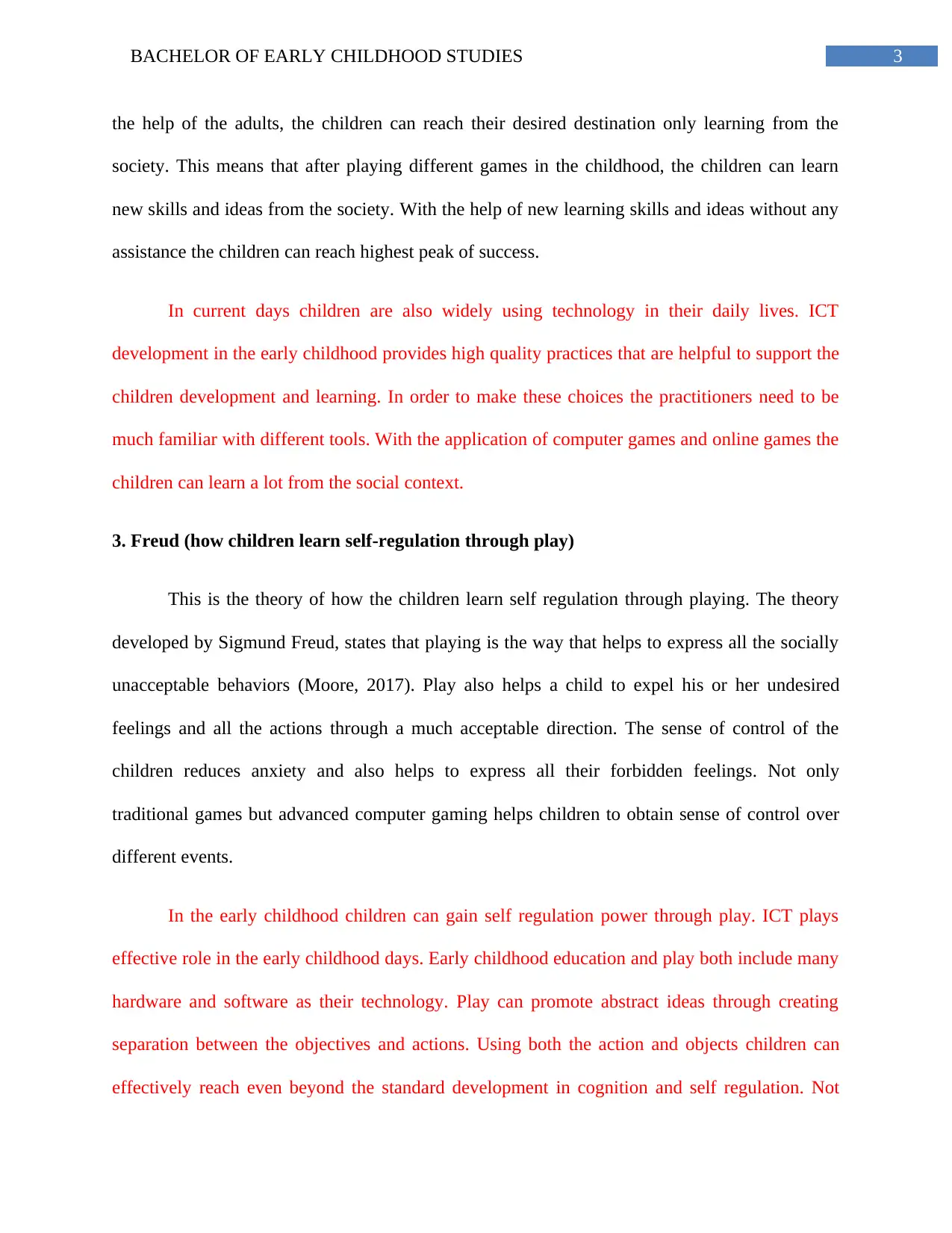
3BACHELOR OF EARLY CHILDHOOD STUDIES
the help of the adults, the children can reach their desired destination only learning from the
society. This means that after playing different games in the childhood, the children can learn
new skills and ideas from the society. With the help of new learning skills and ideas without any
assistance the children can reach highest peak of success.
In current days children are also widely using technology in their daily lives. ICT
development in the early childhood provides high quality practices that are helpful to support the
children development and learning. In order to make these choices the practitioners need to be
much familiar with different tools. With the application of computer games and online games the
children can learn a lot from the social context.
3. Freud (how children learn self-regulation through play)
This is the theory of how the children learn self regulation through playing. The theory
developed by Sigmund Freud, states that playing is the way that helps to express all the socially
unacceptable behaviors (Moore, 2017). Play also helps a child to expel his or her undesired
feelings and all the actions through a much acceptable direction. The sense of control of the
children reduces anxiety and also helps to express all their forbidden feelings. Not only
traditional games but advanced computer gaming helps children to obtain sense of control over
different events.
In the early childhood children can gain self regulation power through play. ICT plays
effective role in the early childhood days. Early childhood education and play both include many
hardware and software as their technology. Play can promote abstract ideas through creating
separation between the objectives and actions. Using both the action and objects children can
effectively reach even beyond the standard development in cognition and self regulation. Not
the help of the adults, the children can reach their desired destination only learning from the
society. This means that after playing different games in the childhood, the children can learn
new skills and ideas from the society. With the help of new learning skills and ideas without any
assistance the children can reach highest peak of success.
In current days children are also widely using technology in their daily lives. ICT
development in the early childhood provides high quality practices that are helpful to support the
children development and learning. In order to make these choices the practitioners need to be
much familiar with different tools. With the application of computer games and online games the
children can learn a lot from the social context.
3. Freud (how children learn self-regulation through play)
This is the theory of how the children learn self regulation through playing. The theory
developed by Sigmund Freud, states that playing is the way that helps to express all the socially
unacceptable behaviors (Moore, 2017). Play also helps a child to expel his or her undesired
feelings and all the actions through a much acceptable direction. The sense of control of the
children reduces anxiety and also helps to express all their forbidden feelings. Not only
traditional games but advanced computer gaming helps children to obtain sense of control over
different events.
In the early childhood children can gain self regulation power through play. ICT plays
effective role in the early childhood days. Early childhood education and play both include many
hardware and software as their technology. Play can promote abstract ideas through creating
separation between the objectives and actions. Using both the action and objects children can
effectively reach even beyond the standard development in cognition and self regulation. Not
⊘ This is a preview!⊘
Do you want full access?
Subscribe today to unlock all pages.

Trusted by 1+ million students worldwide
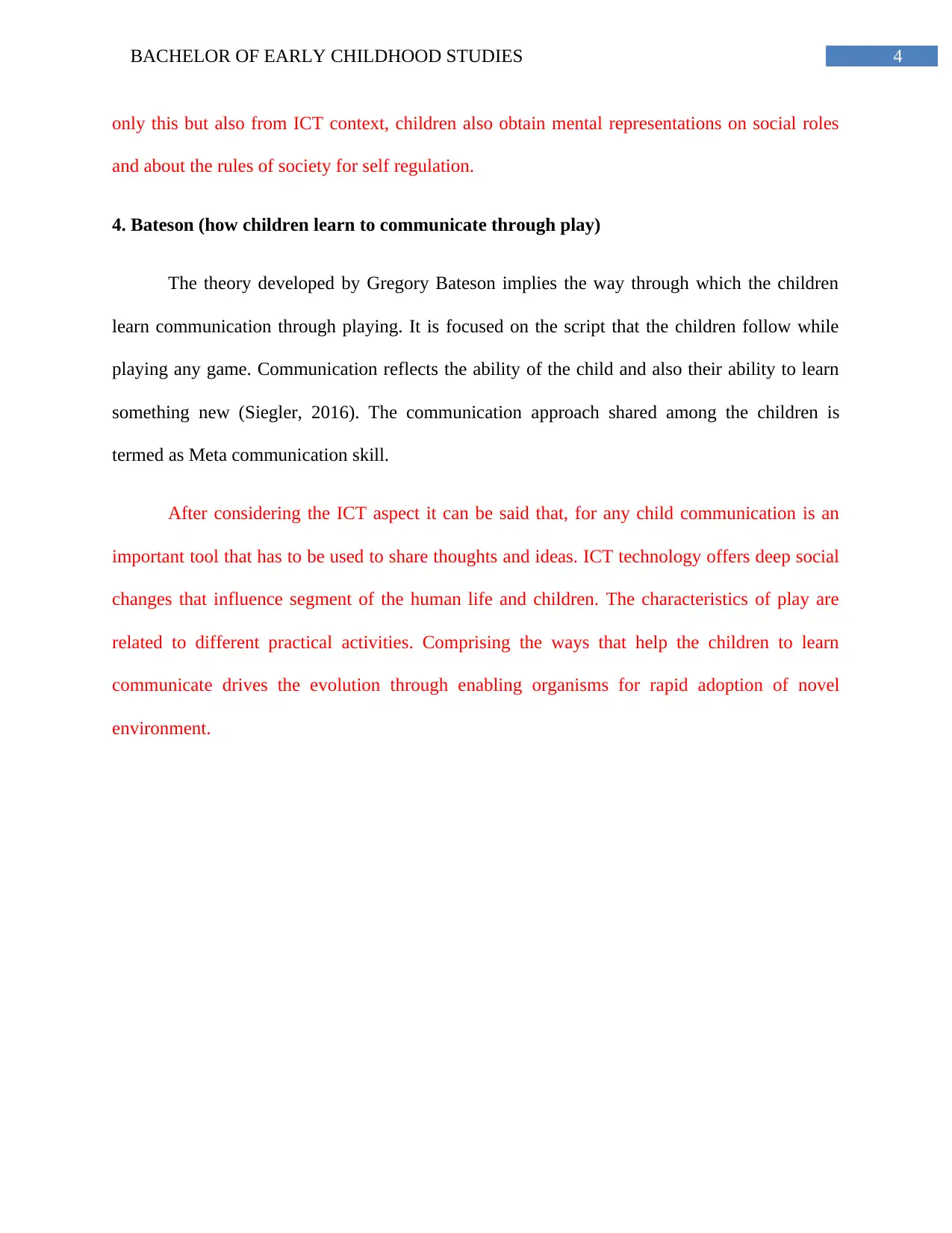
4BACHELOR OF EARLY CHILDHOOD STUDIES
only this but also from ICT context, children also obtain mental representations on social roles
and about the rules of society for self regulation.
4. Bateson (how children learn to communicate through play)
The theory developed by Gregory Bateson implies the way through which the children
learn communication through playing. It is focused on the script that the children follow while
playing any game. Communication reflects the ability of the child and also their ability to learn
something new (Siegler, 2016). The communication approach shared among the children is
termed as Meta communication skill.
After considering the ICT aspect it can be said that, for any child communication is an
important tool that has to be used to share thoughts and ideas. ICT technology offers deep social
changes that influence segment of the human life and children. The characteristics of play are
related to different practical activities. Comprising the ways that help the children to learn
communicate drives the evolution through enabling organisms for rapid adoption of novel
environment.
only this but also from ICT context, children also obtain mental representations on social roles
and about the rules of society for self regulation.
4. Bateson (how children learn to communicate through play)
The theory developed by Gregory Bateson implies the way through which the children
learn communication through playing. It is focused on the script that the children follow while
playing any game. Communication reflects the ability of the child and also their ability to learn
something new (Siegler, 2016). The communication approach shared among the children is
termed as Meta communication skill.
After considering the ICT aspect it can be said that, for any child communication is an
important tool that has to be used to share thoughts and ideas. ICT technology offers deep social
changes that influence segment of the human life and children. The characteristics of play are
related to different practical activities. Comprising the ways that help the children to learn
communicate drives the evolution through enabling organisms for rapid adoption of novel
environment.
Paraphrase This Document
Need a fresh take? Get an instant paraphrase of this document with our AI Paraphraser
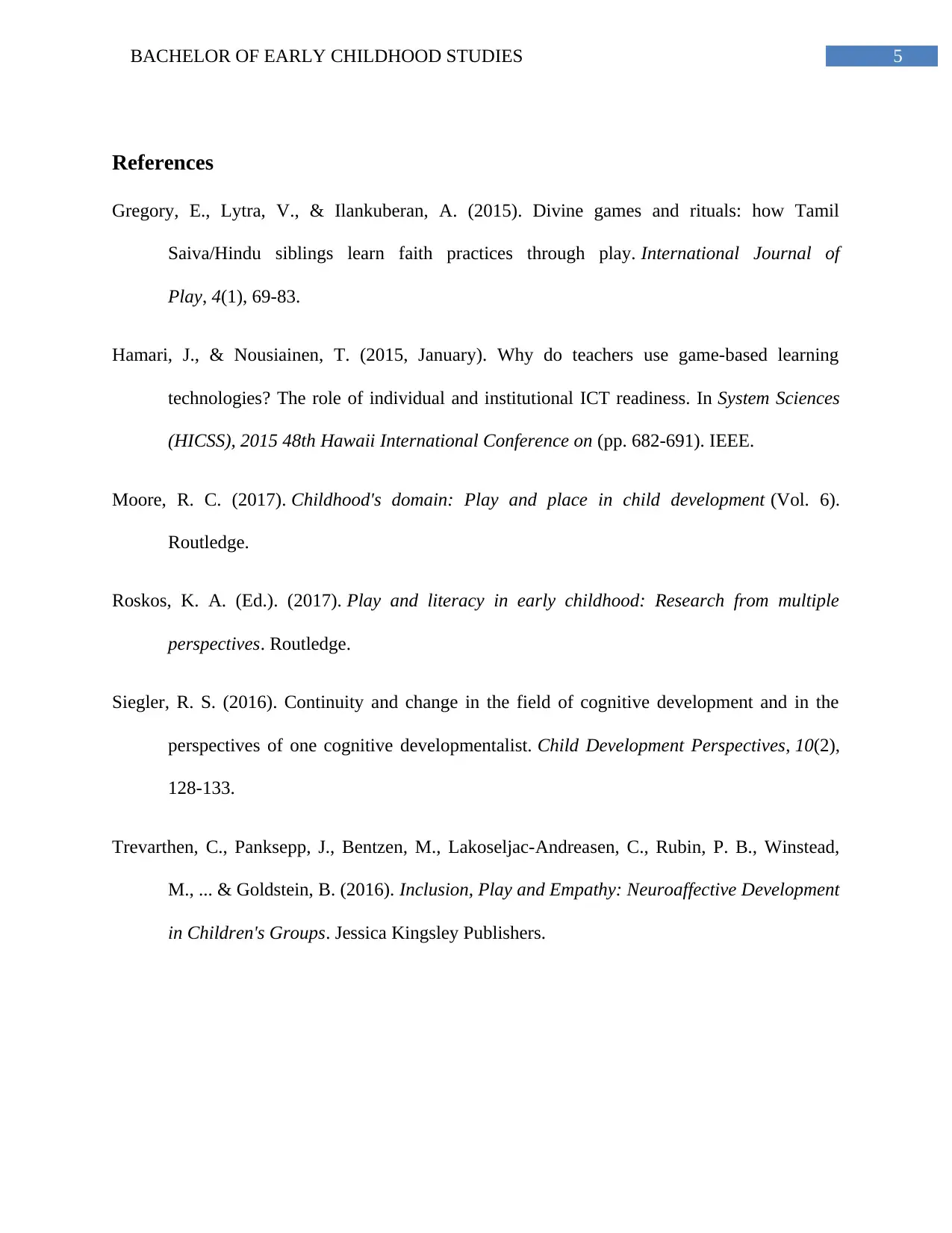
5BACHELOR OF EARLY CHILDHOOD STUDIES
References
Gregory, E., Lytra, V., & Ilankuberan, A. (2015). Divine games and rituals: how Tamil
Saiva/Hindu siblings learn faith practices through play. International Journal of
Play, 4(1), 69-83.
Hamari, J., & Nousiainen, T. (2015, January). Why do teachers use game-based learning
technologies? The role of individual and institutional ICT readiness. In System Sciences
(HICSS), 2015 48th Hawaii International Conference on (pp. 682-691). IEEE.
Moore, R. C. (2017). Childhood's domain: Play and place in child development (Vol. 6).
Routledge.
Roskos, K. A. (Ed.). (2017). Play and literacy in early childhood: Research from multiple
perspectives. Routledge.
Siegler, R. S. (2016). Continuity and change in the field of cognitive development and in the
perspectives of one cognitive developmentalist. Child Development Perspectives, 10(2),
128-133.
Trevarthen, C., Panksepp, J., Bentzen, M., Lakoseljac-Andreasen, C., Rubin, P. B., Winstead,
M., ... & Goldstein, B. (2016). Inclusion, Play and Empathy: Neuroaffective Development
in Children's Groups. Jessica Kingsley Publishers.
References
Gregory, E., Lytra, V., & Ilankuberan, A. (2015). Divine games and rituals: how Tamil
Saiva/Hindu siblings learn faith practices through play. International Journal of
Play, 4(1), 69-83.
Hamari, J., & Nousiainen, T. (2015, January). Why do teachers use game-based learning
technologies? The role of individual and institutional ICT readiness. In System Sciences
(HICSS), 2015 48th Hawaii International Conference on (pp. 682-691). IEEE.
Moore, R. C. (2017). Childhood's domain: Play and place in child development (Vol. 6).
Routledge.
Roskos, K. A. (Ed.). (2017). Play and literacy in early childhood: Research from multiple
perspectives. Routledge.
Siegler, R. S. (2016). Continuity and change in the field of cognitive development and in the
perspectives of one cognitive developmentalist. Child Development Perspectives, 10(2),
128-133.
Trevarthen, C., Panksepp, J., Bentzen, M., Lakoseljac-Andreasen, C., Rubin, P. B., Winstead,
M., ... & Goldstein, B. (2016). Inclusion, Play and Empathy: Neuroaffective Development
in Children's Groups. Jessica Kingsley Publishers.
1 out of 5
Related Documents
Your All-in-One AI-Powered Toolkit for Academic Success.
+13062052269
info@desklib.com
Available 24*7 on WhatsApp / Email
![[object Object]](/_next/static/media/star-bottom.7253800d.svg)
Unlock your academic potential
Copyright © 2020–2026 A2Z Services. All Rights Reserved. Developed and managed by ZUCOL.





